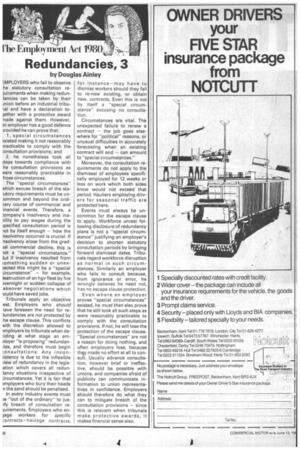[he Employment Act 1980
Page 94

If you've noticed an error in this article please click here to report it so we can fix it.
Redundancies, 3
by Douglas Ainley
EMPLOYERS who fail to observe he statutory consultation reluirements when making redunlancies can be taken by their Jnion before an industrial tribuial and have a declaration tojether with a protective award riade against them. However, in employer has a good defence )rovided he can prove that: 1, special circumstances )xisted making it not reasonably )racticable to comply with the ;onsultation provisions; and 2, he nonetheless took all ;tens towards compliance with he consultation provisions as were reasonably practicable in hose circumstances.
The "special circumstances" which excuse breach of the stautory requirements must be un;ommon and beyond the ordiiary course of commercial and inancial events. Therefore, a ;ompany's insolvency and ina)ility to pay wages during the ;pecified consultation period is lot by itself enough how the nsolvency occurred is crucial. If nsolvency arose from the gradJai commercial decline, this is iot a "special circumstance." 3ut if insolvency resulted from ;omething sudden or unex)ected this might be a "special :ircumstance" — for example, lestruction of an hgv fleet by fire wernight or sudden collapse of akeover negotiations which ;ould have saved jobs.
Tribunals apply an objective est. Employers who should -rave foreseen the need for relundancies are not protected by he escape clause. This conflicts with the discretion allowed to )mployers by tribunals when de;iding at what stage an em)loyer "is proposing" redundan;ies, and therefore must begin ;onsultations. Any incon;istency is due to the inflexible fiew of redundancy in the legisation which covers all reduniancy situations irrespective of ;ircumstances. Yet it is fair that mplwers who bury their heads n the sand should be penalised. In every industry events must )e "out of the ordinary" to jusify breach of consultation reluirements. Employers who enage workers for specific :ontracts— haulage contracts,
for instance—may have to dismiss workers should they fail to re-new existing, or obtain new, contracts. Even this is not by itself a "special circumstance" excusing no consultation.
Circumstances are vital. The unexpected failure to renew a contract — the job goes elsewhere for "political" reasons, or unusual difficulties in accurately forecasting when an existing contract will end — can amount to "special circumstances."
Moreover, the consultation requirements do not apply to the dismissal of employees specifically employed for 12 weeks or less on work which both sides know would not exceed that period. Hauliers employing drivers for seasonal traffic are protected here.
Events must always be uncommon for the escape clause to apply. Workforce unrest following disclosure of redundancy plans is not a "special circumstance" justifying an employer's decision to shorten statutory consultation periods by bringing forward dismissal dates. Tribunals regard workforce disruption as normal in such circumstances. Similarly an employer who fails to consult because, from ignorance or error, he wrongly believes he need not, has no escape clause protection.
Even where an employer proves "special circumstances" existed, he must then also prove that he still took all such steps as were reasonably practicable to comply with the consultation provisions. If not, he will lose the protection of the escape clause. "Special circumstances" are not a reason for doing nothing, and often employers lose, because thy made no effort at all to consult. Usually advance consultation, however brief or ineffective, should be possible with unions, and companies afraid of publicity can communicate information to union representatives in confidence. Employers should therefore do what they can to mitigate breach of the consultation provisions — since this is relevant when tribunals make protective awards, it makes financial sense also.












































































































































